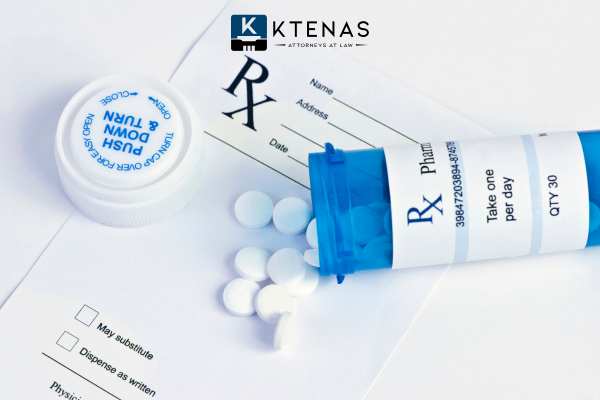Can You Legally Record Police Officers?
11/09/2025
In Chicago, driving under the influence (DUI) doesn’t only apply to alcohol. You can also face DUI charges for operating a vehicle while impaired by prescription drugs. Even if your medication is legally prescribed, you could still be at risk if it affects your ability to drive safely. Many people don’t realize that substances like painkillers, anti-anxiety medications, and sleep aids can impair driving and lead to serious legal consequences.
If you’ve been charged with a DUI for prescription drugs, it’s crucial to have experienced legal representation. Call Ktenas Law at (312) 756-8652 today to discuss your case and learn how our Chicago defense lawyers can help protect your rights and guide you through the legal process.
Yes, prescription drugs are included in Illinois DUI laws. Under Illinois law, a driver can be charged with driving under the influence (DUI) if they are impaired by any substance, including prescription medications. The law applies if the driver’s ability to operate a vehicle safely is compromised, even if the drugs were legally prescribed.
Drivers in Illinois should be cautious when taking any prescription medications and ensure they are aware of the potential side effects that may impact their ability to drive.
The prescription drugs most commonly involved in DUI cases tend to fall into specific categories due to their ability to impair cognitive and motor functions. These are the types of prescription drugs frequently seen in DUI-related incidents:

In most DUI cases involving prescription drugs, the issue is not that the driver was using an illegal substance, but rather that the medication affected their ability to drive safely. Even if prescribed, driving while impaired by these drugs can still result in DUI charges.
During a DUI stop involving prescription drugs, law enforcement officers are trained to recognize signs of impairment, even if the driver hasn’t consumed alcohol. Here’s what officers typically look for in a prescription drug DUI stop:
The initial reason for the stop often relates to the way the driver is operating the vehicle. Officers look for erratic driving patterns that may indicate impairment, such as:
Once the driver is stopped, officers observe for physical signs that suggest the driver may be under the influence of prescription drugs:
Officers often ask the driver to perform field sobriety tests to assess their coordination and cognitive function. Common tests include:
While these tests are often used for alcohol-related stops, they can still help officers detect signs of drug impairment.
Law enforcement officers also pay attention to how the driver is behaving and communicating:
In some cases, the officer may detect the smell of drugs or spot prescription bottles inside the vehicle. While most prescription drugs don’t emit strong odors like alcohol or marijuana, visible medication containers or spilled pills may raise suspicion.

If a driver admits to taking prescription drugs, officers will ask about:
In some jurisdictions, officers trained as Drug Recognition Experts may be called in to assess whether a driver is under the influence of drugs. DREs follow a 12-step protocol that includes checking vital signs, pupil size, muscle tone, and more to determine what type of drug may be impairing the driver.
If the officer suspects the driver is impaired, they may request a chemical test, such as:
Even though a driver may have a valid prescription, impaired driving can lead to DUI charges. Law enforcement focuses on impairment, regardless of whether the substance is legal or prescribed.
In Chicago, the penalties for driving under the influence of prescription drugs can be severe and vary based on the specifics of the case, such as prior offenses and the circumstances surrounding the DUI.
A first-time DUI offense in Chicago may result in a misdemeanor charge, leading to fines ranging from $500 to $2,500. Additionally, offenders may face up to one year in jail. Repeat offenders or those with aggravating factors could face felony charges, which carry harsher penalties.
A DUI conviction typically results in an automatic driver’s license suspension. For a first offense, the suspension period may last from six months to one year, while subsequent offenses can lead to longer suspensions.
Courts may impose probation instead of jail time, especially for first-time offenders. Additionally, participation in a substance abuse treatment program may be mandated. Beyond fines, offenders may incur other costs such as legal fees, court costs, and increased insurance premiums. A DUI conviction can also affect employment opportunities, particularly for jobs that require driving.
Facing a DUI charge for prescription drugs in Chicago can be overwhelming, but you don’t have to navigate it alone. Understanding your legal options and building a strong defense are essential steps in protecting your future. The laws around prescription drug DUIs can be complex, and the penalties may be just as severe as those for alcohol-related offenses.
If you’re dealing with DUI charges related to prescription drugs, contact our Chicago DUI firm today. Our experienced team is ready to fight for your rights and work toward the best possible outcome for your case. Don’t wait—reach out now for a consultation.

